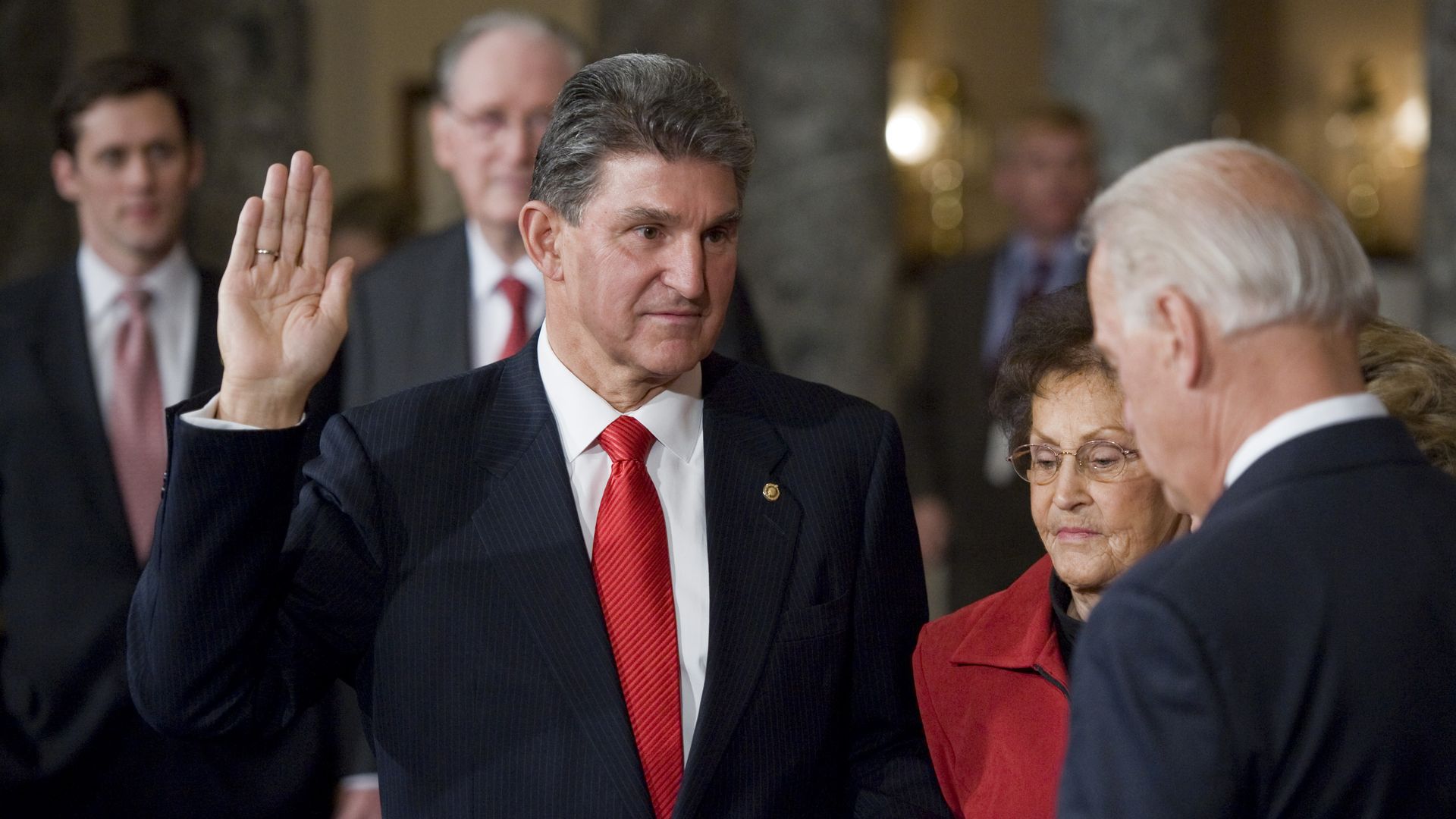| | | | | | | Presented By HCA Healthcare | | | | Axios Sneak Peek | | By the Axios Politics team ·Sep 16, 2021 | | Welcome back to Sneak. A sub deal Down Under ignited a depth charge in Europe. Smart Brevity™ count: 1,374 words ... 5 minutes. Edited by Glen Johnson. | | | | | | 1 big thing: Scoop - Biden bombs with Manchin |  | | | Then-Vice President Joe Biden conducts a ceremonial swearing-in for Sen. Joe Manchin in 2010. Photo: Tom Williams/Roll Call | | | | President Biden failed to persuade Sen. Joe Manchin (D-W.Va.) to agree to spending $3.5 trillion on the Democrats' budget reconciliation package during their Oval Office meeting yesterday, people familiar with the matter tell Axios' Hans Nichols. Why it matters: Defying a president from his own party — face-to-face — is the strongest indication yet Manchin is serious about cutting specific programs and limiting the price tag of any potential bill to $1.5 trillion. His insistence could blow up the deal for progressives and others. - Axios was told Biden explained to Manchin his opposition could imperil the $1.2 trillion bipartisan infrastructure bill that's already passed the Senate. Biden's analysis did little to persuade Manchin to raise his top line.
- Manchin held his position and appears willing to let the bipartisan bill hang in the balance, given his entrenched opposition to many of the specific proposals in the $3.5 trillion spending package, Axios was told.
- While the two left the meeting having made little progress, and are still some $2 trillion apart, the conversation was friendly and they agreed to keep talking.
What they're saying: "Sen. Manchin is an important partner," said Andrew Bates, deputy White House press secretary. "We do not discuss the contents of private meetings." Flashback: In early March, with Biden's $1.9 trillion COVID-19 relief package in danger of failing, he called Manchin and told him, "If you don't come along, you're really f**king me," according to a new book by Bob Woodward and Robert Costa. Between the lines: While Biden has claimed he's pursuing a dual-track approach on the two spending bills, he's occasionally jumped tracks — like when he essentially threatened to veto the bipartisan transportation bill moments after endorsing it. - Two days later, Biden withdrew his threat and said in a statement that a veto threat "was certainly not my intent."
- His latest comments to Manchin linking the two bills underscore a political reality on Capitol Hill: House progressives will sink the $1.2 trillion bipartisan transportation bill if Manchin and Sen. Kyrsten Sinema (D-Ariz.) don't agree to massive amounts of new spending in the reconciliation package.
- Biden wants to use the Democrat-only reconciliation package to expand the social safety net as part of his Build Back Better Agenda.
Keep reading. Go deeper: The White House said tonight the president spoke with House Speaker Nancy Pelosi (D-Calif.) and Senate Minority Leader Chuck Schumer (D-N.Y.) about "their ongoing coordination and outreach around making the case for building an economy that delivers for the middle class." |     | | | | | | 2. Swing voters oppose Texas abortion law |  | | | Protesters at a rally at the Texas State Capitol. Photo: Jordan Vonderhaar/Getty Images | | | | All 10 swing voters in Axios' latest focus groups — including those who described themselves as "pro-life" — said they oppose Texas' new anti-abortion law. Why it matters: If their responses reflect larger patterns in U.S. society, this could hurt Republicans with women and independents in next year's midterm elections, Axios' Sarah Mucha writes. The swing voters cited overreach, invasion of privacy and concerns about frivolous lawsuits jamming up the courts. - The law that went into effect this month bans abortions after six weeks of pregnancy.
- It also incentivizes people to sue anyone suspected of helping a pregnant woman obtain an abortion by offering a reward of up to $10,000.
Details: Sentiments against the Texas law were some of the key takeaways from our latest Engagious/Schlesinger focus groups. The Sept. 14 sessions included 10 voters, in key swing states around the country, who backed Donald Trump in 2016 but switched to Joe Biden in 2020. - While a focus group is not a statistically significant sample like a poll, the responses show how some voters in crucial states are thinking and talking about current events.
- Eight of the 10 voters said abortion is an issue they would vote on in the midterms. Nine voters said if the abortion law passed in Texas was up for debate in their state, it would be an issue that would drive their vote.
Between the lines: Many of the voters did not know the extent of the law's enforcement. Once the details were described, they listed a number of reasons why they believed its implementation was problematic. - "This is like Big Brother's watching," said Gerard A., 50, of Michigan. "You're interfering with other peoples' private lives. … You're asking us to spy on each other."
- "You can't confide in anybody. … This might make somebody suicidal," said Carly L., 33, from Minnesota. "I think this is very extreme. It's actually — wow — I guess I'm just really shocked."
What they're saying: Engagious president Rich Thau, who moderated the sessions, said they underscore how pivotal voter education may be on this issue. - That portends aggressive ad campaigns on both sides.
- "Democrats should worry that swing voters barely know how the Texas law works, particularly its enforcement," he said. "Republicans should worry that, once swing voters understand the law, they'll think it's too extreme."
Keep reading. Go deeper: "Swing voters' split feelings about Afghanistan" |     | | | | | | 3. Mapped: Who can be recalled |  Re-created from Ballotpedia; Map: Axios Visuals Gov. Gavin Newsom defeated the effort to recall him this week — but there are 10 other states besides California allowing recalls of any elected state official, Axios' Stef Kight reports. The big picture: Officials across the U.S. have come under extra scrutiny for how they've handled the coronavirus and the 2020 elections in each state. By the numbers: This year, there have been seven recall efforts against governors, in Alaska, Arizona, Louisiana, Michigan, North Dakota and Washington, as well as California. - Governors aren't the only ones facing the threat. Ballotpedia tracked 164 recall efforts against 262 officials during the first half of this year —at least 77 were tied to the handling of the pandemic in 2020 and 2021.
- Rules about who can be recalled vary in each state.
- Only 11 states don't allow any state official to be recalled.
|     | | | | | | A message from HCA Healthcare | | HCA Healthcare's commitment to advancing ethical standards | | |  | | | | This year, HCA Healthcare was recognized for the 11th time by Ethisphere as one of the World's Most Ethical Companies. Why it's important: Ethisphere is a global leader in defining and advancing ethical business practices. Learn more about how HCA Healthcare shows up. | | | | | | 4. Axios World: Biden blindsides Europe |  | | | Photo illustration: Sarah Grillo/Axios. Photo: Melina Mara/The Washington Post via Getty Images | | | | The president didn't just blow it with Joe Manchin this week. Long-standing allies aren't happy with some of the moves he's making to counter China, Zachary Basu and Dave Lawler write for tonight's edition of Axios World. Why it matters: While Biden heralded a new agreement to help Australia acquire nuclear submarines as part of a trilateral security pact with the U.K. and U.S., it torqued off some friends — especially the French. - French Foreign Minister Jean-Yves Le Drian said in a radio interview today: "Allies don't do this to each other," and compared Biden's announcement to "what Mr. Trump used to do."
- Australia is scrapping a $90 billion submarine deal with France — described as "the contract of the century" when signed in 2016 — to enter the new "AUKUS" partnership.
- Le Drian called it "a stab in the back," and the French defense minister said she didn't learn the news until Biden announced it last night — just the latest key decision on which Biden has blindsided his European allies.
To make matters worse, the announcement came just one day before the EU was set to present its own much-anticipated strategy for the Indo-Pacific, embarrassing the Europeans just as they sought to flex their own geopolitical muscle. - "I suppose that a deal like that wasn't cooked the day before yesterday," the EU's top diplomat Josep Borrell said at a press conference to unveil the strategy, which was consumed by questions about AUKUS. "Despite that, we weren't informed."
- A senior Biden administration official told Axios the timing of the announcement had "no connection" to the EU's plans, and said U.S. officials had "been in touch with their French counterparts to discuss AUKUS, including before the announcement."
The big picture: Biden's stated China strategy has long been to bring like-minded allies together to push back on Beijing. - Europe was to be at the heart of that approach, and France in particular, as a leading military power and the only EU country with overseas territories in the Indo-Pacific.
- Successive U.S. administrations have encouraged European allies to "step up their presence in the Indo-Pacific," notes Benjamin Haddad, director of the Atlantic Council's Europe Center. "And so a strategic dimension, I think, was overlooked by the American administration."
Keep reading. ✍🏼 Sign up for Dave's biweekly tour-de-force here. |     | | | | | | 5. Pic du jour: The mounting toll |  | | | Photo: Mandel Ngan/AFP via Getty Images | | | | Flags on the National Mall recall the American lives lost to COVID-19. - The project is by artist Suzanne Brennan Firstenberg.
|     | | | | | | A message from HCA Healthcare | | The U.S. hospital system that's treated the most COVID-19 inpatients | | |  | | | | HCA Healthcare confirmed their first COVID-19 case in January 2020. Key Numbers: This includes more than 173,000 patients admitted for inpatient care as of June, 30 2021. | | | | 📬 Thanks for reading this week. We'll be back Sunday evening. A reminder that your family, friends and colleagues can subscribe to this or any of Axios' free newsletters through this link. |  | | It'll help you deliver employee communications more effectively. | | | | | | Axios thanks our partners for supporting our newsletters. If you're interested in advertising, learn more here.
Sponsorship has no influence on editorial content. Axios, 3100 Clarendon Blvd, Suite 1300, Arlington VA 22201 | | | You received this email because you signed up for newsletters from Axios.
Change your preferences or unsubscribe here. | | | Was this email forwarded to you?
Sign up now to get Axios in your inbox. | | | | Follow Axios on social media:    | | | | | |










No comments:
Post a Comment